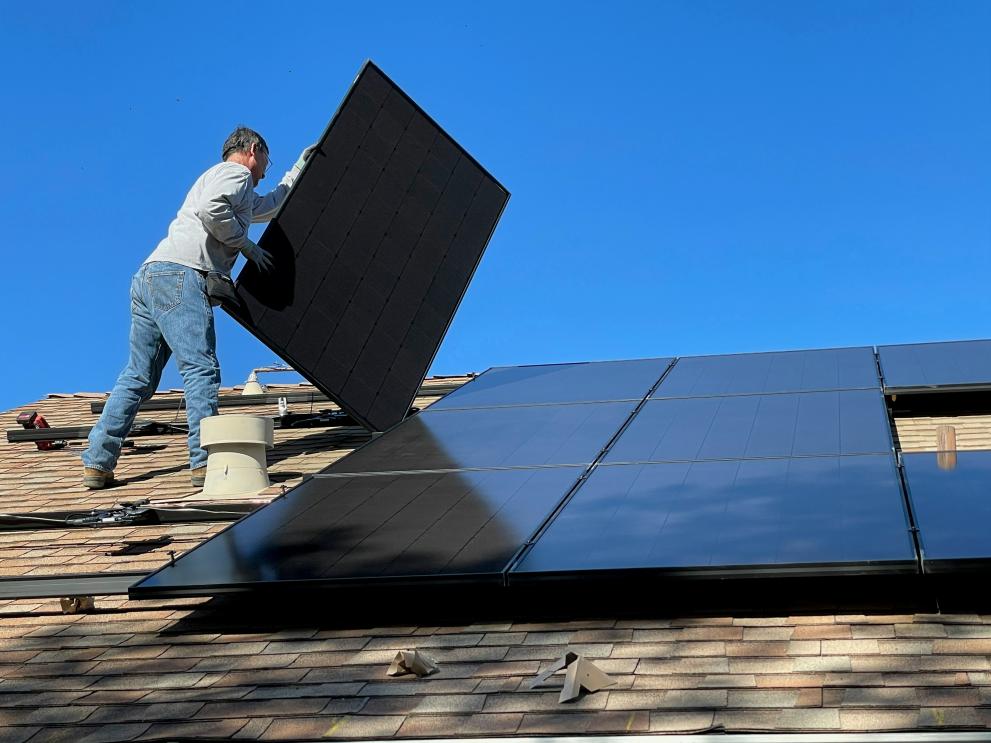
The Commission welcomes today's final adoption of the strengthened Energy Performance of Buildings Directive, another milestone of the European Green Deal. This legislation sets the framework for Member States to reduce emissions and energy use in buildings across the EU, from homes and workplaces to schools, hospitals and other public buildings. This will help improve people's health and quality of life. The revised Directive sets ambitious targets to reduce the overall energy use of buildings across the EU, taking into account national specificities. It leaves in Member States' hands which buildings to target and which measures to take. It will boost the demand for clean technologies made in Europe, and create jobs, investment, and growth.
Each Member State will adopt its own national trajectory to reduce the average primary energy use of residential buildings, by 16% by 2030 and 20-22% by 2035. For non-residential buildings, they will need to renovate the 16% worst-performing buildings by 2030 and the 26% worst-performing buildings by 2033. Member States will have the possibility to exempt certain categories of residential and non-residential buildings from these obligations, including historical buildings or holiday homes. Citizens will be supported in their efforts to improve their homes. The Directive requires the establishment of one-stop shops for advice on building renovation and provisions on public and private financing will make renovation more affordable and feasible.
The Directive will boost Europe's energy independence, in line with the REPowerEU Plan, by reducing our use of imported fossil fuels. The revised Directive will make ‘zero-emissions' the standard for new buildings. All new residential and non-residential buildings must have zero on-site emissions from fossil fuels, as of 1 January 2028 for publicly-owned buildings and as of 1 January 2030 for all other new buildings, with a possibility for specific exemptions. The strengthened Directive contains new provisions to progressively phase-out fossil fuels from heating in buildings and boost the deployment of solar power installations, taking into account the national circumstances. Member States will also have to ensure that new buildings are ‘solar ready'. Subsidies for the installation of stand-alone boilers powered by fossil fuels will not be allowed as of 1 January 2025. It will also boost the uptake of sustainable mobility thanks to provisions on pre-cabling, recharging points for electric vehicles and bicycle parking spaces.
Better planning of renovations and technical and financial support will be crucial to trigger a Renovation Wave across the EU, and this is foreseen under the revised Directive. To fight energy poverty and bring down energy bills, financing measures will have to incentivise and accompany renovations and be targeted in particular at vulnerable customers and worst-performing buildings, in which a higher share of energy-poor households live.
Next steps
The revised Directive will be published in the Official Journal of the Union and enter into force in the coming weeks. Member States will then have to transpose it into their national legislation.
Background
Buildings are responsible for around 40% of the EU's energy consumption, more than half of EU gas consumption (mainly through heating, cooling and domestic hot water), and 35% of the energy-related greenhouse gas emissions. At present, about 35% of the EU's buildings are over 50 years old and almost 75% of the building stock is energy inefficient. At the same time, the average annual energy renovation rate is only about 1%.
In 2020, the Commission presented its Renovation Wave Strategy to at least double renovation rates by 2030 and to make sure that renovations lead to higher energy efficiency and more renewables in buildings. The Commission's proposal to revise the EPBD in December 2021 was further supplemented by additional elements on the deployment of solar energy on buildings as part of the REPowerEU plan in May 2022. The co-legislators reached a political agreement in December 2023.
The Directive is a key building block in the EU's efforts to transition away from fossil fuels and to double the rate of energy efficiency improvements and triple renewable energy capacity by 2030, as agreed with global partners at COP28. Today's adoption builds on the completion and entry into force of the “Fit for 55” legislation, and will contribute to reducing greenhouse gas emissions by at least 55% by 2030.
For More Information
Questions and Answers – Boosting the energy performance of buildings across the Union
Quote(s)
To succeed in the green transition, we need to make sure that the transformation changes people’s lives for the better. We want to help people to make their homes more energy efficient, more comfortable and healthier. This revised Directive is a win-win for citizens: improving the energy performance of buildings will result in both lower energy bills and lower greenhouse gas emissions
Maroš Šefčovič, Executive Vice-President for European Green Deal, Interinstitutional Relations and Foresight
Improving the energy performance of buildings is vital for reaching our ambition of climate-neutrality and as well as for boosting Europe’s energy independence. Renovations are investments into a better future. I trust this strengthened Directive will empower Member States to spur a renovation wave across the EU, while respecting the diversity of the EU’s building stock.
Kadri Simson, Commissioner for Energy
In a climate-neutral Europe, we need to be able to heat and cool our homes and buildings with minimum emissions. We have the technologies to do this, but we need to create a stronger business case for renovations. The new Energy Performance of Buildings Directive will help mobilise additional finance and boost construction value chains. Together we can help homeowners and businesses renovate to save money and prepare for a net-zero future.
Wopke Hoekstra, Commissioner for Climate Action
Details
- Publication date
- 12 April 2024
- Author
- Representation in Cyprus
